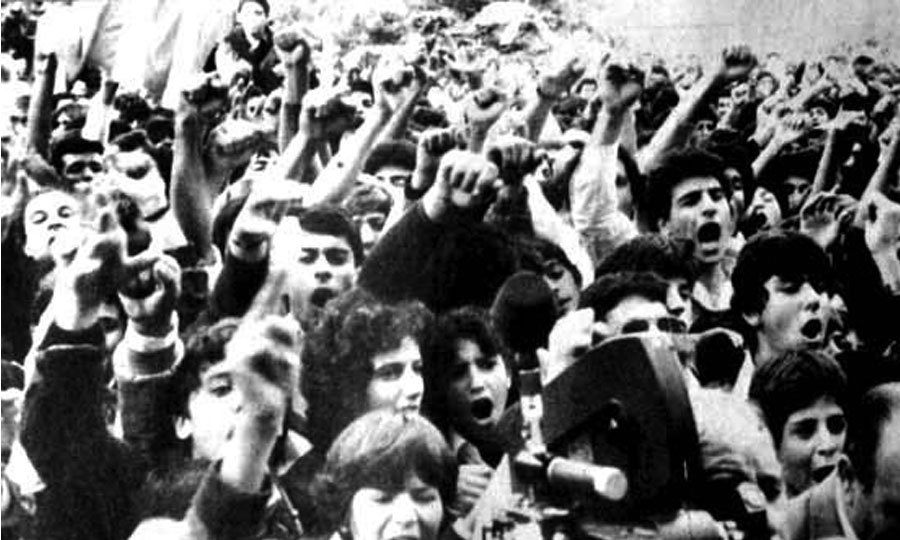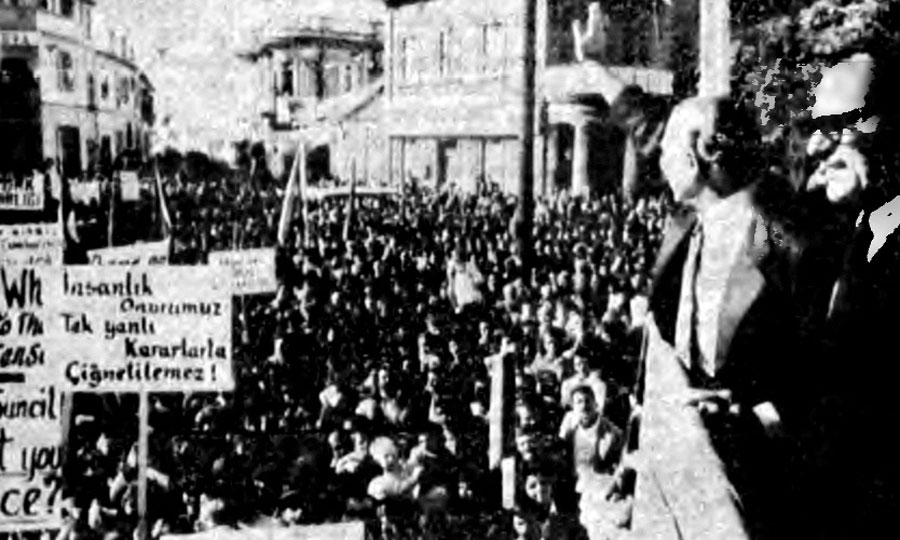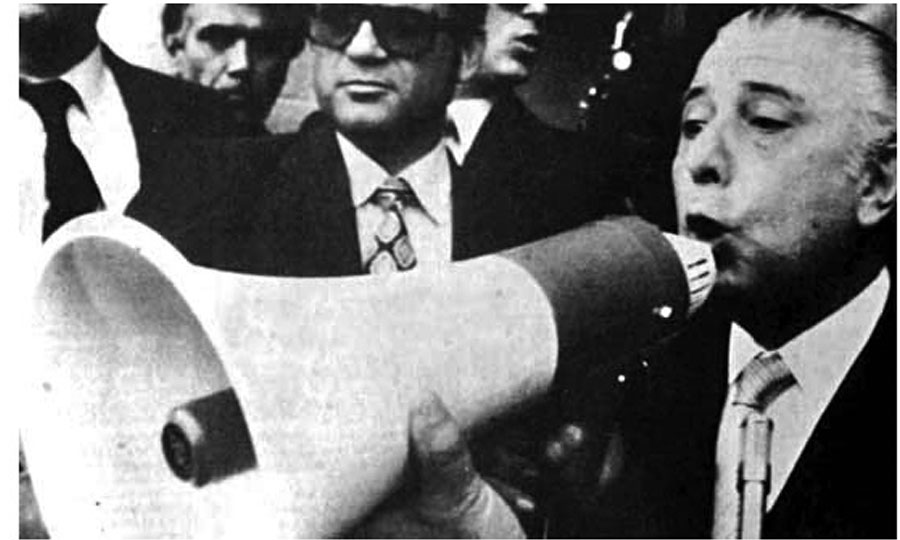

Apostolos Kouroupakis
On 15 November 1983, the Turkish Cypriot side unilaterally declared the occupied territories as the "Turkish Republic of Northern Cyprus" (TRNC). This decision by Rauf Denktash did not come as a shock to Cyprus, as it was a significant development in the ongoing Cyprus issue. In 2024, 50 years after the coup and the invasion, and 41 years after the creation of the TRNC, which is recognized only by Turkey, the Republic of Cyprus remains in disarray. The United Nations resolutions have had little impact, and President Spyros Kyprianou's appeal on the day of the declaration still resonates: "[...] the freedom of all of Cyprus must be restored, and the solution must be one that ensures the full sovereignty, territorial integrity, unity, and nonalignment of the Cypriot state, along with the restoration of the rights of our people."
In his address to the Cypriot people on the morning of the declaration of the pseudo-state, President Spyros Kyprianou said that the Republic had made representations to all countries and international organizations. As noted in Kyprianou's speech, it was still unclear whether Turkey had formally recognized the new state, with this only being inferred from media reports. However, Kyprianou emphasized that Denktash and his associates could not have taken this step without the presence of an occupying army. Kyprianou called on the international community to demonstrate that it would not accept the "law of the jungle." Snapshots from the Greek Cypriot protests on November 15, 1983, in Ledra Palace
Snapshots from the Greek Cypriot protests on November 15, 1983, in Ledra Palace
The UN Security Council convened on 18 November, under intense circumstances. George Iakovou, then Foreign Minister (after Nikos Rolandis resigned in September 1983), spoke at the Security Council. He stated, "Turkey is solely responsible for this alleged declaration of independence, which would have been impossible without Turkey's occupation of this area of the Republic of Cyprus." Iakovou highlighted that Turkey's military and political control over the occupied territories meant that the region was far from independent, and as a result, political, moral, and military responsibility for the situation lay with Turkey until democracy was restored across Cyprus.
On the matter of the suddenness of Denktash’s declaration, Nikos Rolandis, Foreign Minister from 1978 to 1983, recalled in an interview with K that he had warned Kyprianou about the likelihood of the Turkish Cypriots declaring a "state." Rolandis shared that he had been told by diplomatic circles that Denktash was planning the move, and that Kyprianou had discussed it with Romanian President Nicolae Ceaușescu, who denied any such plans. Rolandis, although acknowledging that the international community supported Cyprus, believed that more preparation could have been made. He added, "We should have prevented the invasion and the declaration, not just reacted to them after the fact." Snapshot of the celebrations of the Turkish Cypriots in Seraglio Square in occupied Nicosia, on November 21, 1983
Snapshot of the celebrations of the Turkish Cypriots in Seraglio Square in occupied Nicosia, on November 21, 1983
In a press conference held in October 1983, Kyprianou had said that he could not be certain of Denktash's intentions to declare an independent state, considering such threats were often issued when there were developments in the Cyprus issue. "Whenever there is a development, whether a UN General Assembly resolution or otherwise, it is usually followed by a threat of declaring an independent state," Kyprianou had remarked. Despite these warnings, on the morning of 15 November 1983, Denktash declared the establishment of the TRNC, prompting the Republic of Cyprus to seek diplomatic avenues to counter the risks this posed to the national question.
In his own remarks, Denktash posed a question: "What did you expect us to do? To become a vassal to the Greek Cypriots, to give up our rights and submit to them?" He argued that the declaration was necessary because, as long as Greek Cypriots believed they could suppress the identity, communal existence, and rights of Turkish Cypriots, the Cyprus problem would remain unresolved, and the future of his people would be at risk. Cyprus’s Permanent Representative to the United Nations, Andreas Moussiuttas, countered that the declaration could not have occurred without Turkey's approval and support. Snapshots from the Greek Cypriot protests on November 15, 1983, in Ledra Palace
Snapshots from the Greek Cypriot protests on November 15, 1983, in Ledra Palace
Resolution 541
The UN Security Council responded swiftly, adopting Resolution 541 on 18 November 1983, which condemned the declaration of the "TRNC" as illegal. The resolution called on all UN member states not to recognize any republic other than the Republic of Cyprus. The vote was 13 in favor, with one negative vote from Pakistan and an abstention from Jordan. A year later, Resolution 550 reinforced this stance, asserting that the Republic of Cyprus was the only legitimate government on the island and expressing concern over attempts to settle Varosha with non-residents. The resolution demanded the return of this area to UN administration.
Official Communiqués
On 15 November 1983, the presidency issued a communiqué (No. 6) from President Kyprianou, addressing the Cypriot people and detailing the government's actions following Denktash's declaration. Kyprianou reported that Cyprus had made representations to all countries and international organizations and that Foreign Minister Nikos Rolandis had departed for New York. Kyprianou also spoke with Greek Prime Minister Andreas Papandreou, British Prime Minister Margaret Thatcher, UN Secretary-General Javier Pérez de Cuéllar, and others.
In his statement, Kyprianou called on Turkish Cypriots to reject these actions, which he warned would lead to further complications for both communities. He also urged the international community to put pressure on Turkey to abandon the declaration and respect international law.
Greek Prime Minister Andreas Papandreou, in his statement, condemned Denktash’s declaration and Turkey’s immediate recognition, calling it a blatant violation of UN agreements. Papandreou reiterated Greece's commitment to Cyprus’s sovereignty, emphasizing that the Greek and Cypriot people were now counting on their allies.
In addition, a communiqué (No. 3) issued on the same day discussed Kyprianou’s address to students in Nicosia. Kyprianou praised the student protests, which were fueled by patriotism and a commitment to resisting any recognition of Denktash’s declaration. Slogans like "People united, never defeated" and "Greece - Cyprus side by side" were chanted during the demonstration.
Turkish Cypriot Perspective
Meanwhile, in a demonstration in Ataturk Square in the occupied part of Nicosia, Turkish Cypriots rallied in defense of their "democracy," shouting, "No – No – No to those who wanted to divert us from this path in various ways," as reported by the Turkish Cypriot newspaper Isci Postasi.
Denktash’s Reflections
Rauf Denktash expressed pride in the creation of the pseudo-state, likening his satisfaction to a family leader whose loved ones had been saved from danger. According to Nikos Moudouros, Denktash had received approval from some centers in Ankara, particularly from the military and senior officials in the 'Foreign Ministry', though not from the entire government. Denktash explained that the timing was strategic, coinciding with the transition of Turkish governments, which would leave the new government with little influence over a fait accompli.
The TRNC Flag
One of the first actions taken by the new TRNC government was to launch a competition to design a new flag for the self-declared state. The competition called for flags measuring 50x70 cm, and the new flag was adopted on 7 March 1984. Interestingly, the flag of the Republic of Cyprus had been designed by Turkish Cypriot painter Ismet Giunei, who won a competition held in 1960, immediately after independence was achieved.
[This article was translated from its Greek original]































